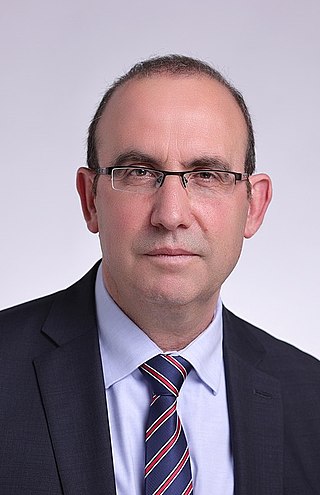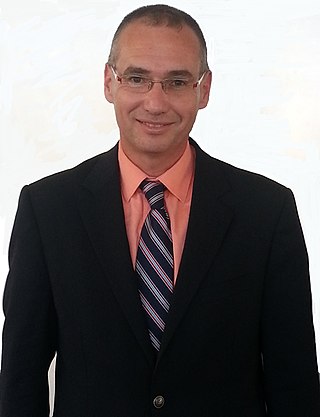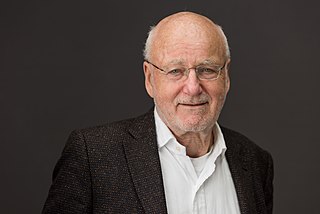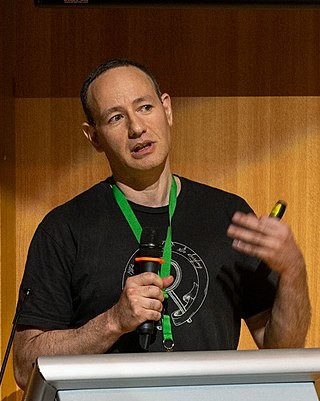Peter G. Schultz is an American chemist, entrepreneur, and nonprofit leader. He is the CEO and President and Professor of Chemistry at Scripps Research, the founder and former director of GNF, and the founding director of the California-Skaggs Institute for Innovative Medicines, established in 2012. In August 2014, Nature Biotechnology ranked Schultz the #1 top translational researcher in 2013. Schultz's contributions to the field of chemistry have included the development and application of methods to expand the genetic code of living organisms, the discovery of catalytic antibodies, and the development and application of molecular diversity technologies to address problems in chemistry, biology, and medicine.

Ruth Arnon is an Israeli biochemist and codeveloper of the multiple sclerosis drug Copaxone. She is currently the Paul Ehrlich Professor of Immunology at the Weizmann Institute of Science, where she is researching anti-cancer and influenza vaccinations.

Karen B. Avraham is an Israeli-American human geneticist and the first female Dean of the Tel Aviv University's Faculty of Medicine. Born in Canada in 1962, Avraham moved to the US at a young age. Her research focuses on the discovery and characterization of genes responsible for hereditary hearing loss.

Gary Bruce Ruvkun is an American molecular biologist and Nobel laureate at Massachusetts General Hospital and professor of genetics at Harvard Medical School in Boston.
Nahum Sonenberg, is an Israeli Canadian microbiologist and biochemist. He is a James McGill professor of biochemistry at McGill University in Montreal, Quebec, Canada. He was an HHMI international research scholar from 1997 to 2011 and is now a senior international research scholar. He is best known for his seminal contributions to our understanding of translation, and notable for the discovery of the mRNA 5' cap-binding protein, eIF4E, the rate-limiting component of the eukaryotic translation apparatus.

Ehud Gazit is an Israeli biochemist, biophysicist and nanotechnologist. He is Professor and Endowed Chair at Tel Aviv University and a member of the executive board of the university. In 2015, he was knighted by the Italian Republic for services to science and society. He was recently elected as the 2023 International Solvey Chair in Chemistry, a position that was previously held by 15 of the top world scientists including three Nobel laureates.

Sangeeta N. Bhatia is an American biological engineer and the John J. and Dorothy Wilson Professor at MIT’s Institute for Medical Engineering and Science and Electrical Engineering and Computer Science (EECS) at the Massachusetts Institute of Technology (MIT) in Cambridge, Massachusetts, United States. Bhatia's research investigates applications of micro- and nano-technology for tissue repair and regeneration. She applies ideas from computer technology and engineering to the design of miniaturized biomedical tools for the study and treatment of diseases, in particular liver disease, hepatitis, malaria and cancer.

Aviv Regev is a computational biologist and systems biologist and Executive Vice President and Head of Genentech Research and Early Development in Genentech/Roche. She is a core member at the Broad Institute of MIT and Harvard and professor at the Department of Biology of the Massachusetts Institute of Technology. Regev is a pioneer of single cell genomics and of computational and systems biology of gene regulatory circuits. She founded and leads the Human Cell Atlas project, together with Sarah Teichmann.

Ruth Nussinov is an Israeli-American biologist born in Rehovot who works as a professor in the Department of Human Genetics, School of Medicine at Tel Aviv University and is the senior principal scientist and principal investigator at the National Cancer Institute, National Institutes of Health. Nussinov is also the editor in chief of the Current Opinion in Structural Biology and formerly of the journal PLOS Computational Biology.

Lucy Shapiro is an American developmental biologist. She is a professor of Developmental Biology at the Stanford University School of Medicine. She is the Virginia and D.K. Ludwig Professor of Cancer Research and the director of the Beckman Center for Molecular and Genetic Medicine.

Hermona Soreq is an Israeli professor of Molecular Neuroscience at The Hebrew University of Jerusalem. Best known for her work on the signaling of acetylcholine and its relevance in stress responses and neurodegenerative diseases such as Parkinson's and Alzheimer's.
Jorge Enrique Galán is an Argentinian-American microbiologist who specializes in infectious disease, bacterial pathogenesis including Salmonella.

Feng Zhang is a Chinese–American biochemist. Zhang currently holds the James and Patricia Poitras Professorship in Neuroscience at the McGovern Institute for Brain Research and in the departments of Brain and Cognitive Sciences and Biological Engineering at the Massachusetts Institute of Technology. He also has appointments with the Broad Institute of MIT and Harvard. He is most well known for his central role in the development of optogenetics and CRISPR technologies.

Don W. Cleveland is an American cancer biologist and neurobiologist.
Michael Karin is an Israeli-American Distinguished Professor of Pharmacology, Ben and Wanda Hildyard Chair for Mitochondrial and Metabolic Diseases, and American Cancer Society Research Professor at the University of California, San Diego.

Arnon Afek is an Israeli physician who specializes in pathology and medical management. Afek served as Director-General of the Israeli Ministry of Health in 2014–2015. He is currently Deputy Director-General of Sheba Medical Center and acting director of Sheba General Hospital at Tel Hashomer.

Bob Löwenberg is a clinical hematologist/investigator. He is a professor of hematology at Erasmus University Rotterdam.

Tamir Tuller is an Israeli engineer, a computer scientist, and a systems and synthetic biologist. He is a professor, incumbent of the Chair in Computational Synthetic Biology, and the director of Tel Aviv University's Laboratory of Computational Systems and Synthetic Biology. As of February 2022, Tuller has authored over 150 peer-reviewed scientific journal articles and hundreds of additional types of publications and patents. In addition, he is the founder and primary instructor of the International Genetically Engineered Machine program at Tel Aviv University and an entrepreneur.

Isaac P. Witz is an Israeli Immunologist and cancer researcher, who is professor Emeritus at the Shmunis School of Biomedicine and Cancer Research in Tel Aviv University (TAU), where he was formerly the vice president for Research and Development and the Dean of Faculty of Life Sciences. He is one of the scientists who laid the foundations of the tumor microenvironment (TME) research field.
Ruth Ashery-Padan is an Israeli geneticist who is a professor and principal investigator in the Department of Human Genetics and Molecular Medicine at the Sackler Faculty of Medicine, Tel Aviv University. She is known for her contributions to the understanding of ocular development.















